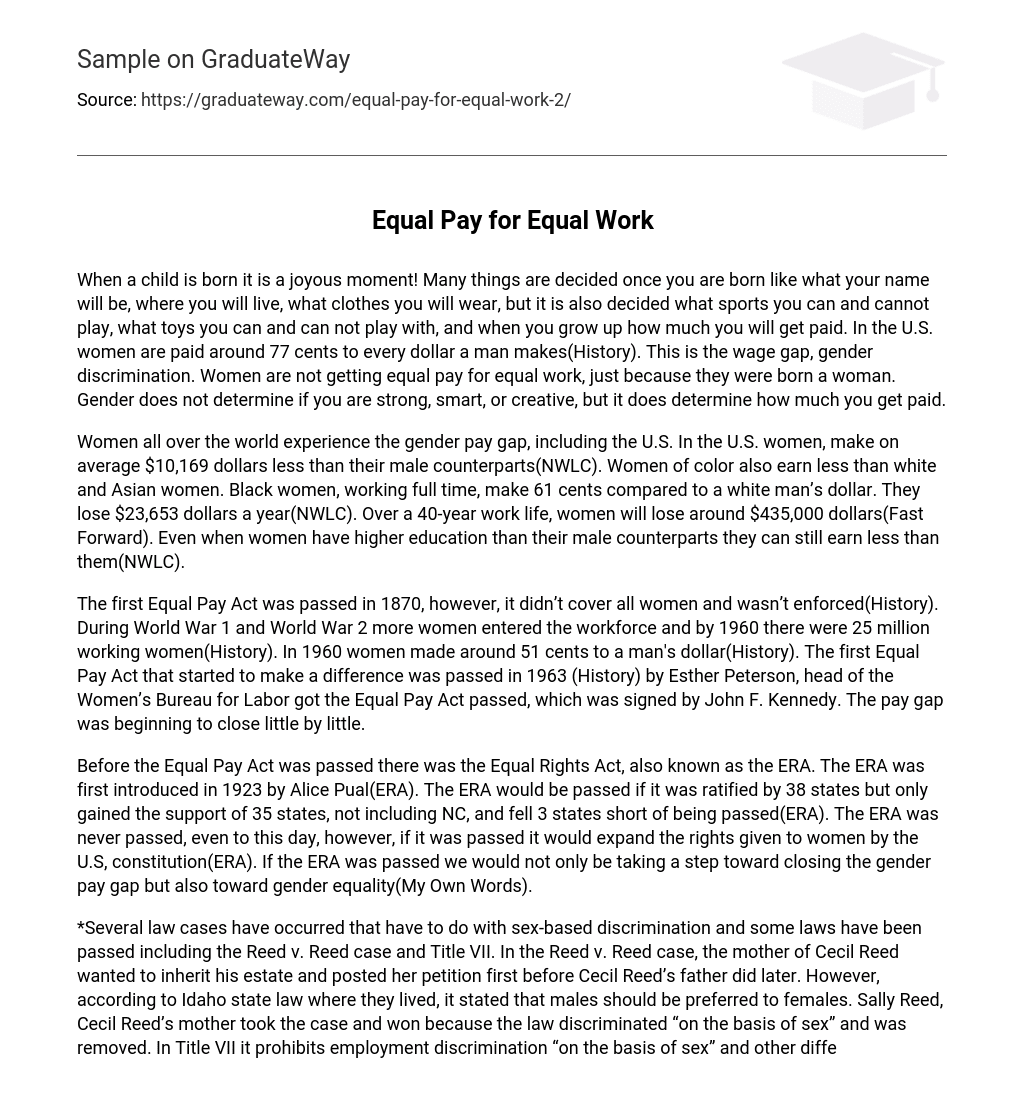When a child is born it is a joyous moment! Many things are decided once you are born like what your name will be, where you will live, what clothes you will wear, but it is also decided what sports you can and cannot play, what toys you can and can not play with, and when you grow up how much you will get paid. In the U.S. women are paid around 77 cents to every dollar a man makes(History). This is the wage gap, gender discrimination. Women are not getting equal pay for equal work, just because they were born a woman. Gender does not determine if you are strong, smart, or creative, but it does determine how much you get paid.
Women all over the world experience the gender pay gap, including the U.S. In the U.S. women, make on average $10,169 dollars less than their male counterparts(NWLC). Women of color also earn less than white and Asian women. Black women, working full time, make 61 cents compared to a white man’s dollar. They lose $23,653 dollars a year(NWLC). Over a 40-year work life, women will lose around $435,000 dollars(Fast Forward). Even when women have higher education than their male counterparts they can still earn less than them(NWLC).
The first Equal Pay Act was passed in 1870, however, it didn’t cover all women and wasn’t enforced(History). During World War 1 and World War 2 more women entered the workforce and by 1960 there were 25 million working women(History). In 1960 women made around 51 cents to a man’s dollar(History). The first Equal Pay Act that started to make a difference was passed in 1963 (History) by Esther Peterson, head of the Women’s Bureau for Labor got the Equal Pay Act passed, which was signed by John F. Kennedy. The pay gap was beginning to close little by little.
Before the Equal Pay Act was passed there was the Equal Rights Act, also known as the ERA. The ERA was first introduced in 1923 by Alice Pual(ERA). The ERA would be passed if it was ratified by 38 states but only gained the support of 35 states, not including NC, and fell 3 states short of being passed(ERA). The ERA was never passed, even to this day, however, if it was passed it would expand the rights given to women by the U.S, constitution(ERA). If the ERA was passed we would not only be taking a step toward closing the gender pay gap but also toward gender equality(My Own Words).
*Several law cases have occurred that have to do with sex-based discrimination and some laws have been passed including the Reed v. Reed case and Title VII. In the Reed v. Reed case, the mother of Cecil Reed wanted to inherit his estate and posted her petition first before Cecil Reed’s father did later. However, according to Idaho state law where they lived, it stated that males should be preferred to females. Sally Reed, Cecil Reed’s mother took the case and won because the law discriminated “on the basis of sex” and was removed. In Title VII it prohibits employment discrimination “on the basis of sex” and other differences. Title VII was passed in 1964.
The Gender Pay Gap still exists today even though it has grown smaller and some laws have been passed to make it smaller. In the U.S. in 2011 women made on average 77 cents to a man’s dollar. To get around the laws that have already been passed to make the gender pay gap smaller employers will change the names of jobs to pay women less. Women will still have to work to close the gap all the way.
The gender pay gap not only exits in the U.S. but around the world. In some counties, women are not allowed to do the same job as men. In developing countries, the wage gap is much larger than in developed countries. South Korea has the biggest wage gap in the world when compared to other developed countries. Luxemburg has the smallest wage gap in the world.
How do we close the wage gap? Education is key to closing the gap, providing education to women all over the world the wage gap will begin to close a little more. There is a lack of equal pay laws and we need more laws passed to enforce equal pay. For working women, there needs to be more affordable child care, paid maternity leave, and flexible hours. The social norms of society need to change the most. The views of that men are stronger and smarter than women and that women are just there to look pretty. Gender does not determine if you’re smart, strong, or pretty, so it shouldn’t determine how much you get paid.





